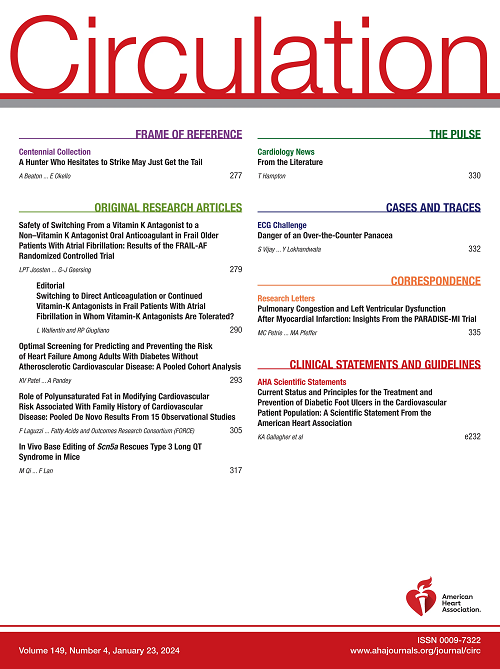A Systematic Review of "Food Is Medicine" Randomized Controlled Trials for Noncommunicable Disease in the United States: A Scientific Statement From the American Heart Association.
IF 38.6
1区 医学
Q1 CARDIAC & CARDIOVASCULAR SYSTEMS
引用次数: 0
Abstract
Poor diet quality is a leading risk factor for cardiometabolic disease (ie, diabetes and diseases associated with metabolism and inflammation), which is present in about half of American adults. Support has grown for incorporating the provision of healthy food as a complement to or a component of clinical care. Such "Food Is Medicine" programs provide free or subsidized healthy food directly to patients in close coordination with the health care system. In this review, we systematically examined published randomized controlled trials examining Food Is Medicine programs in the United States, categorizing them into different stages of development using the National Institutes of Health Model for Behavioral Intervention Development. This review identified a total of 14 randomized controlled trials of Food Is Medicine interventions in the United States with noncommunicable disease outcomes, more than one-third of which were early-stage smaller-scale trials (stage 1 randomized controlled trials). Broad variations in populations enrolled; intervention design, duration, and intensity; and outcomes precluded many direct comparisons between studies. Randomized controlled trial data were generally consistent with findings in the observational literature, indicating that common Food Is Medicine approaches often positively influence diet quality and food security, which are theorized to be key mediators for clinical outcomes. However, the impact on clinical outcomes was inconsistent and often failed to reach statistical significance. These observations highlight the need for larger, higher-quality Food Is Medicine studies focusing on the measurement of clinical outcomes within well-designed programs and the need for additional randomized controlled trials that more systematically map out the relationship between participation in different types of Food Is Medicine programs and health outcomes.美国非传染性疾病“食物即药物”随机对照试验的系统综述:美国心脏协会的科学声明。
不良的饮食质量是导致心脏代谢疾病(即糖尿病和与代谢和炎症相关的疾病)的主要风险因素,大约有一半的美国成年人患有这种疾病。越来越多的人支持将提供健康食品作为临床护理的补充或组成部分。这样的“食物就是药物”项目与卫生保健系统密切协调,直接向患者提供免费或补贴的健康食品。在这篇综述中,我们系统地检查了已发表的随机对照试验,这些试验检查了美国的食品即医学项目,并使用美国国立卫生研究院行为干预发展模型将它们分为不同的发展阶段。本综述确定了在美国针对非传染性疾病结果的食品即药物干预措施的14项随机对照试验,其中三分之一以上是早期小规模试验(1期随机对照试验)。登记人口的广泛差异;干预设计、持续时间和强度;结果排除了许多研究之间的直接比较。随机对照试验数据与观察性文献的发现基本一致,表明常见的食品即药物方法通常对饮食质量和食品安全产生积极影响,这在理论上是临床结果的关键调节因素。然而,对临床结果的影响并不一致,往往达不到统计学意义。这些观察结果强调,需要更大规模、更高质量的食品即医学研究,重点是在精心设计的项目中测量临床结果,还需要额外的随机对照试验,更系统地绘制出参与不同类型的食品即医学项目与健康结果之间的关系。
本文章由计算机程序翻译,如有差异,请以英文原文为准。
求助全文
约1分钟内获得全文
求助全文
来源期刊

Circulation
医学-外周血管病
CiteScore
45.70
自引率
2.10%
发文量
1473
审稿时长
2 months
期刊介绍:
Circulation is a platform that publishes a diverse range of content related to cardiovascular health and disease. This includes original research manuscripts, review articles, and other contributions spanning observational studies, clinical trials, epidemiology, health services, outcomes studies, and advancements in basic and translational research. The journal serves as a vital resource for professionals and researchers in the field of cardiovascular health, providing a comprehensive platform for disseminating knowledge and fostering advancements in the understanding and management of cardiovascular issues.
 求助内容:
求助内容: 应助结果提醒方式:
应助结果提醒方式:


